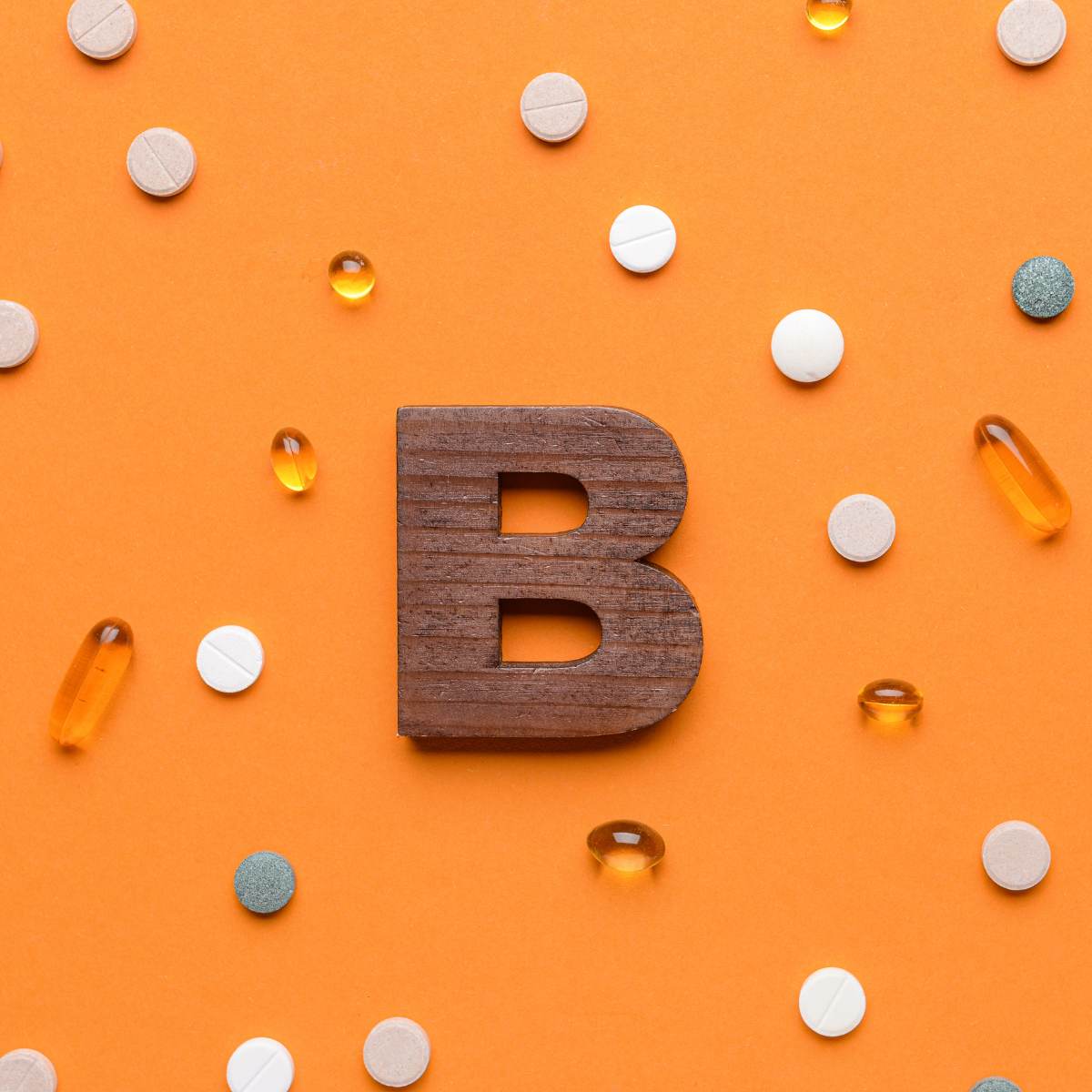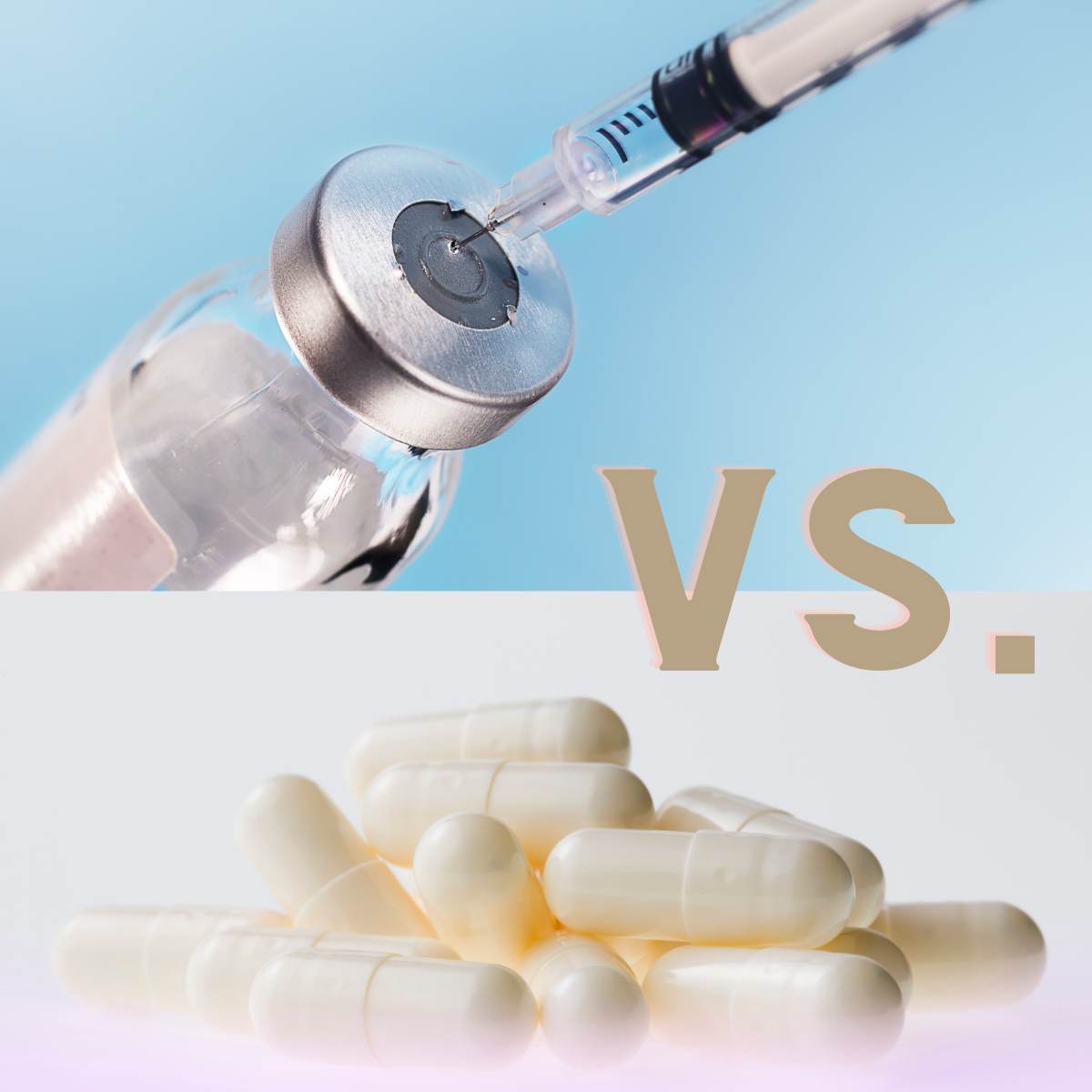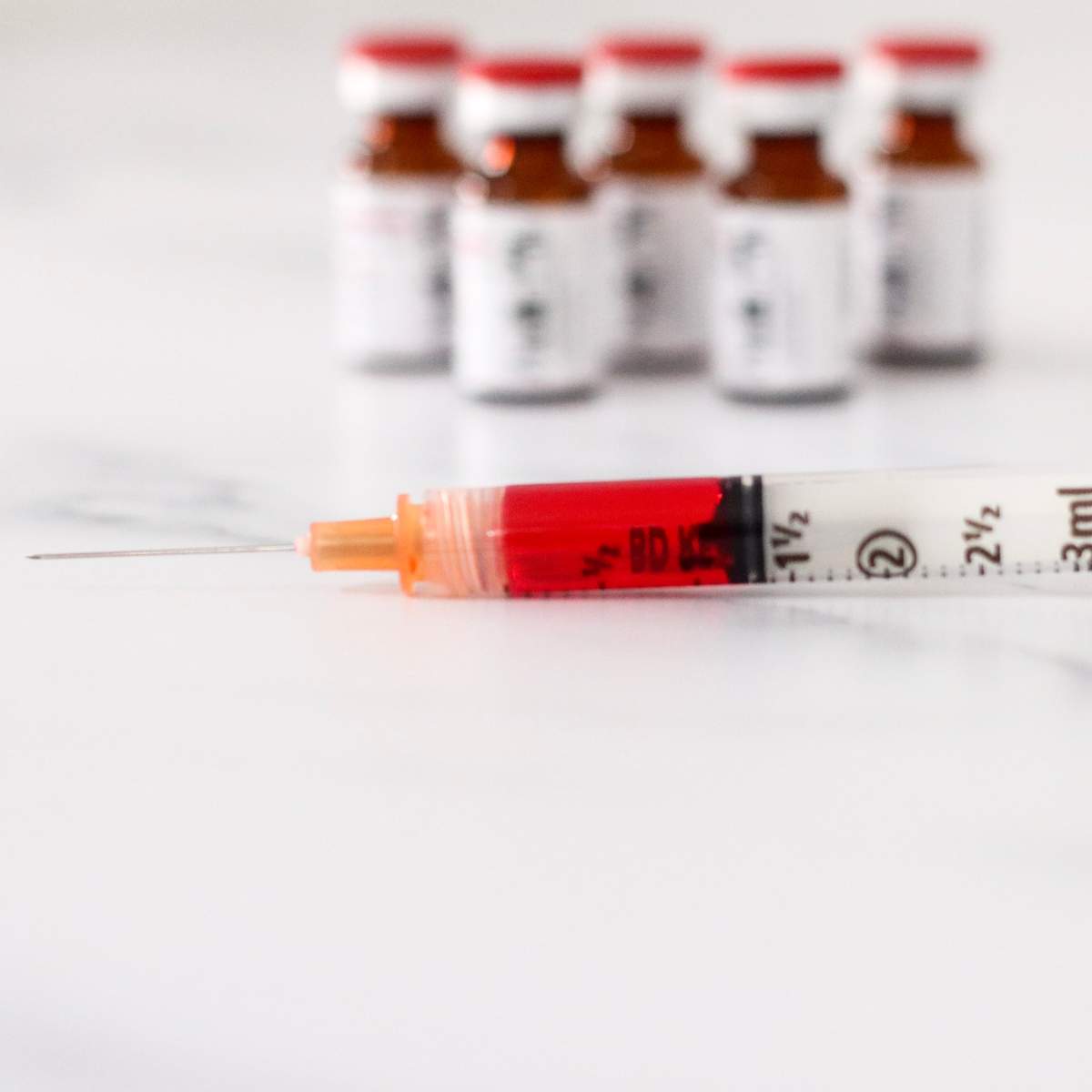B-complex vitamins and B12 are both important for overall health, but they have different functions in the body and are taken for different reasons. Both can be taken orally or as injections and both can be beneficial for certain people. It is important to understand the specific role of each B vitamin in order to determine which supplement is best for you.
What is the Difference Between B12 and B Complex?
B12 is one B vitamin whereas B-complex is the combination of all 8 B vitamins combined, including vitamin B12. B vitamins play an important role in many of the body's functions, including energy production, nerve function, cognitive function, immune system function, and the synthesis of hormones and red blood cells. They are usually taken in supplement form to help with symptoms of deficiency, such as fatigue, anxiety, and memory problems.
What B Vitamins are Included in B Complex?

B complex vitamins are a group of eight water-soluble vitamins that play important roles in the body. The eight vitamins that make up the B-complex group are:
- Vitamin B1 (thiamine)- Vitamin B1, also known as thiamine, is important for the body's metabolism and the proper functioning of the brain, muscles, and heart. It helps the body convert carbohydrates into energy and plays a role in the synthesis of neurotransmitters, which are chemicals that transmit signals in the brain and nervous system.
- Vitamin B2 (riboflavin)- Riboflavin, also known as vitamin B2, is involved in energy metabolism, helping to convert carbohydrates, proteins, and fats into energy. It also helps to maintain healthy skin, nails, and hair. It is necessary for the proper function of the mitochondria, the energy-producing structures in cells.
- Vitamin B3 (niacin)- Vitamin B3, also known as niacin, is important for the metabolism of carbohydrates, fats, and proteins. It helps the body convert food into energy and is involved in the synthesis of hormones and cholesterol. Niacin is also important for the proper functioning of the nervous system and the production of red blood cells.
- Vitamin B5 (pantothenic acid)- B5 is necessary for the synthesis of certain hormones and cholesterol.
- Vitamin B6 (pyridoxine)- Vitamin B6 plays a role in the synthesis of neurotransmitters and regulating amino acids in the body. It also plays a role in the metabolism of homocysteine and may also have anti-inflammatory effects.
- Vitamin B7 (biotin)- Vitamin B7, also known as biotin, is a B vitamin that is important for the metabolism of carbohydrates, fats, and proteins. It helps the body convert food into energy and is involved in the synthesis of hormones and cholesterol. Vitamin B7 is also important for the proper functioning of the skin, hair, and nails.
- Vitamin B9 (folate/folic acid)- Vitamin B9 is involved in the metabolism of homocysteine, an amino acid that has been linked to an increased risk of cardiovascular disease. Several studies have found that people with high levels of homocysteine in their blood are at an increased risk of heart attack, stroke, and other cardiovascular events. Supplementation with folic acid, a synthetic form of folate, has been shown to reduce homocysteine levels and potentially reduce the risk of cardiovascular disease.
- Vitamin B12 (cobalamin)- B12 is essential for the production of red blood cells and the proper functioning of the nervous system. More on B12 below.
As you can see above, each of these vitamins has a specific function in the body. B-complex vitamins are usually taken as oral supplements to help with symptoms of deficiency, such as fatigue, anxiety, and memory problems. They are also often included in multivitamin supplements. They can be taken in injection form as well.
Vitamin B Complex Injections vs Oral B Complex Supplements

B complex injections and oral B complex supplements both provide the body with the essential B vitamins it needs to function properly. However, there are some differences between the two forms of supplementation:
- Absorption: B complex injections are typically more effective at increasing blood levels of the B vitamins than oral supplements because they bypass the digestive system and are absorbed directly into the bloodstream. This can be particularly important for people who have difficulty absorbing B vitamins due to certain medical conditions or digestive issues.
- Convenience: Oral B complex supplements are generally more convenient to take because they can be taken at home, while B complex injections require a visit to a healthcare provider's office or clinic.
- Cost: B complex injections may be more expensive than oral supplements due to the cost of the injection itself and the cost of the healthcare provider's time and expertise.
- Side effects: Both oral B complex supplements and B complex injections can cause side effects in some people, but the risk of side effects may be higher with injections due to the higher doses of the vitamins that are delivered.
How Long Does a B Complex Injection Last?
The duration of action of a B complex injection depends on the specific formulation and the individual's metabolism and other factors. In general, the effects of a B complex injection may last for several weeks or longer.
However, it is important to note that B complex injections are usually given as a one-time treatment or as part of a short-term treatment plan, rather than as a long-term supplementation strategy. If you have been prescribed a B complex injection, it is important to follow the instructions of your healthcare provider and not exceed the recommended dosage.
Disadvantages of Taking B Complex
B complex vitamins are generally considered safe and are essential for good health. However, like any supplement, they can cause side effects in some people and may not be appropriate for everyone. Some potential disadvantages of taking B complex supplements include:
- Interactions with Medications: B complex vitamins can interact with some medications, including certain antibiotics and blood thinners. If you are taking any medications, it is important to talk to your doctor before starting a B complex supplement to ensure that it is safe for you to take.
- Allergic reactions: Some people may be allergic to one or more of the ingredients in B complex supplements, such as cobalt or other additives. If you have a history of allergies or have had a reaction to a supplement in the past, it is important to talk to your doctor before taking a B complex supplement.
- Overdose: It is possible to overdose on B vitamins, although this is rare. Symptoms of a B vitamin overdose may include flushing, diarrhea, and stomach upset. If you experience any unusual symptoms after taking a B complex supplement, you should stop taking the supplement and contact your doctor.
- Masking Underlying Health Issues: While B complex supplements can help improve symptoms of B vitamin deficiency, they will not address the underlying cause of the deficiency. If you are experiencing symptoms of a B vitamin deficiency, it is important to see a medical practitioner for a diagnosis and appropriate treatment.
What is B12?

B12, also known as cobalamin, is a water-soluble vitamin that is essential for brain and nervous system function, as well as the production of red blood cells. It is found naturally in animal-derived foods, such as meat, poultry, fish, eggs, and dairy products.
What Causes B12 Deficiency?
There are several causes of vitamin B12 deficiency, including:
- Insufficient Intake: People who follow a vegetarian or vegan diet may be at risk of vitamin B12 deficiency because the main dietary sources of the vitamin are animal products, such as meat, fish, poultry, eggs, and dairy products.
- Malabsorption: Some people may have difficulty absorbing vitamin B12 from the diet due to certain medical conditions or the use of certain medications, such as proton pump inhibitors (PPIs) or H2 blockers, which reduce stomach acid production.
- Age-related Atrophy of the Stomach Lining: As people age, the stomach lining may atrophy, leading to reduced production of hydrochloric acid and intrinsic factors, which are necessary for the absorption of vitamin B12.
- Pernicious Anemia: This is an autoimmune disorder in which the body's immune system attacks and destroys the cells that produce intrinsic factors, leading to vitamin B12 deficiency.
- Other Medical Conditions: Certain medical conditions, such as Crohn's disease, Celiac disease, and HIV/AIDS, can also cause vitamin B12 deficiency.
Symptoms of B12 Deficiency
B12 deficiency can cause a variety of symptoms, including fatigue, anemia, nerve problems, and memory loss. Severe B12 deficiency can lead to megaloblastic anemia. This causes cells to be very large and abnormally shaped.
Reasons for Vitamin B12 Injections

B12 injections are usually given to people who have difficulty absorbing the vitamin from their diet or who have certain medical conditions that prevent them from absorbing B12 properly.
For example, some people lack a protein called intrinsic factor, which helps with the absorption of vitamin B12. This can lead to B12 deficiency or pernicious anemia.
In other cases, low levels of stomach acid can hinder the ability to absorb B12 from food. This is relatively common in elderly people.
B12 injections can be given in the muscle (intramuscular injections) or under the skin, and are usually given once a week or every two to three weeks.
Side Effects of B12 Injections
B12 injections are generally safe and well-tolerated, with few side effects reported. Some people may experience temporary discomfort or pain at the injection site, or they may develop a rash or swelling. These side effects are typically mild and resolve on their own.
More serious side effects of B12 injections are rare, but they can occur in some people. These may include allergic reactions, such as difficulty breathing, hives, or swelling of the face, lips, tongue, or throat.
If you experience any of these symptoms after receiving a B12 injection, you should seek medical attention immediately. It is important to note that B12 injections should only be administered under the supervision of a healthcare professional, as improper use or administration of the injections can lead to serious health problems.
If you are considering B12 injections, it is important to talk to your healthcare provider about the potential risks and benefits, as well as any concerns you may have.
Can You Take B Complex and B12 Shots Together?
It is generally safe to take B12 and B complex injections together, as long as they are administered by a healthcare professional and the recommended dosages are not exceeded. B12 and B complex injections can be given together in a single injection or as separate injections.
B12 and B complex injections are usually given as a one-time treatment or as part of a short-term treatment plan, rather than as a long-term supplementation strategy.
Precautions
People with certain conditions should not take certain B vitamin supplements without first consulting a healthcare provider. These conditions include:
- Stomach ulcers- Very high doses of B3 (niacin) could elevate the risk for ulcers or exacerbate existing ones.
- Diabetes- High doses (1000mg or more) of B3 (niacin) can interfere with blood sugar control. Read more about niacin adverse effects.
- Kidney Disease- High doses of B12, B6, and folic acid may reduce kidney function. Check out this article for more info.
- Liver Disease- While vitamin B supplements are often given to help with liver disease, high amounts of niacin (B3) have been linked to liver damage. High doses of vitamin B12 may be harmful in people with certain types of liver disease, such as liver failure. In these cases, the liver may not be able to properly metabolize vitamin B12, leading to a build-up of the vitamin in the body. Read more about vitamin B12 metabolism and advanced liver disease.
- Gallbladder Disease- High amounts of niacin could worsen this condition.
- Gout- Niacin can cause excess uric acid in the blood, increasing your risk for gout.
- Low Blood Pressure- B3 (niacin) can cause hypotension
- Pregnancy or Breastfeeding- These may require may supplemental B vitamins, but it is important to consult a healthcare provider before taking them.
- Allergy to Cobalt or any other ingredient in the supplement- These people should not take B complex vitamins.
Conclusion
In summary, B-complex vitamins are a group of eight vitamins that are taken for general health, while B12 is a specific vitamin that is taken to treat or prevent deficiency. Both can be take orally or as injections. I'm not a doctor and this post is not to be taken as medical advice. Please talk to your doctor if you have and questions and to determine what's appropriate for you.
If you liked this post, you may also like:
Ashwagandha vs Maca- Similarities, Differences, and Uses
5 Reasons Why a Balanced Diet is Important
Top Places to Buy Grass-Fed Beef Online
24 Common and Not So Common Hashimoto's Flare Symptoms
References:
Herbert V, Drives B. Staging vitamin B-12 (cobalamin) status in vegetarians. Am J Clin Nutr. 1994;59(5 Suppl):1213S-1222S.
Lederle FA, Johnson DC, Wilson JT, et al. Proton pump inhibitor and histamine 2 receptor antagonist use and vitamin B12 deficiency. JAMA. 2013;310(22):2435-2442.
Andres E, Affenberger S, Rousset S, et al. Vitamin B12 deficiency and aging. Curr Opin Clin Nutr Metab Care. 2009;12(6):646-651.
Stagg AJ, Smith MA, Malyszko J, et al. Pernicious anaemia and vitamin B12 deficiency. Lancet. 2010;376(9747):734-746.
Selhub J, Jacques PF. The role of B vitamins in the prevention and treatment of Alzheimer's disease. Curr Opin Clin Nutr Metab Care. 2014;17(1):1-7.
Wang X, Qin X, Demirtas H, et al. Vitamin B6 intake and risk of stroke: a meta-analysis of prospective studies. Eur J Clin Nutr. 2012;66(5):566-571.
Sabaté J, Oda K, Ros E. Nut consumption and blood lipid levels: a pooled analysis of 25 intervention trials. Arch Intern Med. 2010;170(9):821-827.
Mayo Clinic. (2021). Niacin. Retrieved from https://www.mayoclinic.org/drugs-supplements/niacin/side-effects/drg-20068647
National Institutes of Health. (2020). Niacin. Retrieved from https://ods.od.nih.gov/factsheets/Niacin-Consumer/
House AA, Eliasziw M, Cattran DC, et al. Effect of B-Vitamin Therapy on Progression of Diabetic Nephropathy: A Randomized Controlled Trial. JAMA. 2010;303(16):1603–1609. doi:10.1001/jama.2010.490
Institute of Medicine. (1998). Dietary Reference Intakes for Thiamin, Riboflavin, Niacin, Vitamin B6, Folate, Vitamin B12, Pantothenic Acid, Biotin, and Choline. Washington, D.C.: National Academy Press.

Leave a Reply